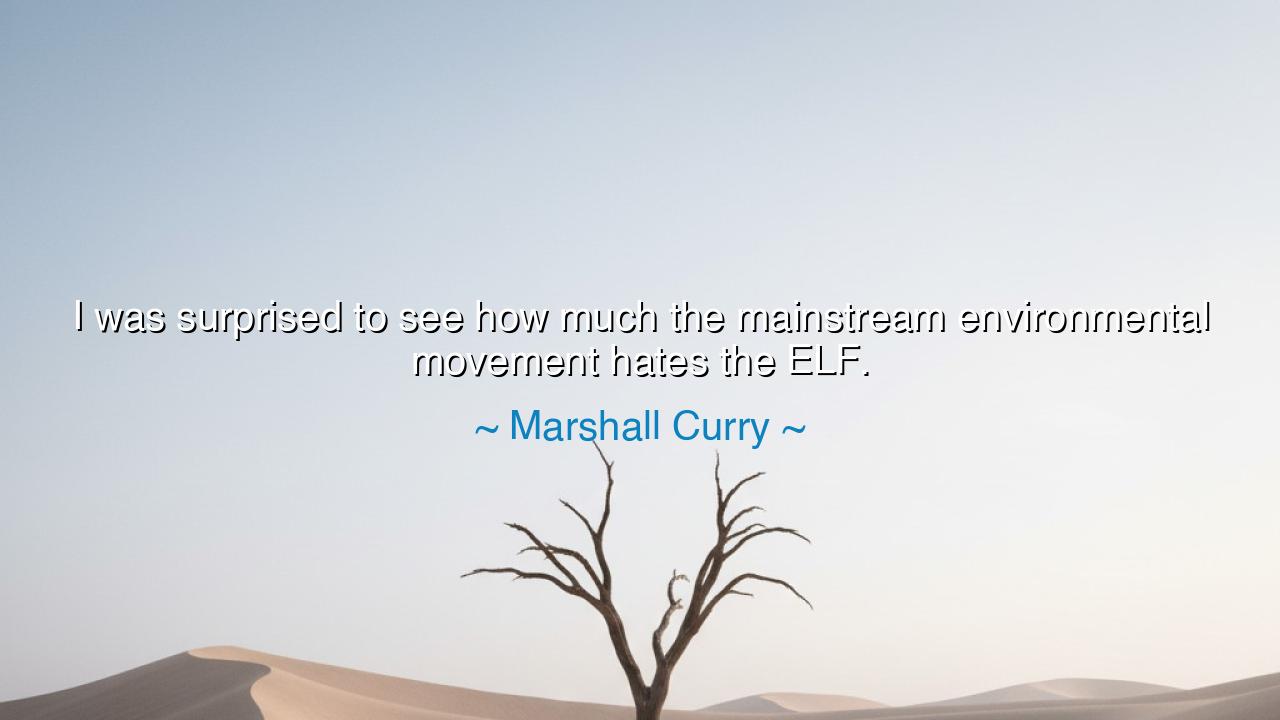
I was surprised to see how much the mainstream environmental






Hear the words of Marshall Curry, who once observed with astonishment: “I was surprised to see how much the mainstream environmental movement hates the ELF.” In this short sentence lies a storm of meaning, for it reveals the deep divisions within those who claim to fight for the same earth. The ELF, the Earth Liberation Front, declared itself a defender of forests, rivers, and air, yet chose the path of fire and destruction to make its voice heard. The mainstream environmental movement, by contrast, sought change through laws, petitions, and the gathering of citizens. Thus arose a great conflict: not between destroyer and defender, but between defenders themselves, torn apart by the question of means.
The ELF saw themselves as warriors, believing that the urgency of the planet’s suffering justified extreme measures. In the night they struck—burning SUVs, torching developments they called wasteful, sending messages in smoke and flame. Their creed was that destruction of property was but a small wound compared to the destruction of ecosystems. Yet their acts invited fear, anger, and condemnation. To many, they were not saviors but saboteurs. Thus, when Curry spoke of his surprise at the hatred from the mainstream movement, he unveiled the truth that even among those who fight for the earth, there is no single path, but many roads, often at odds with one another.
History, too, bears witness to such divides. Consider the struggle for Indian independence. There was Gandhi, who raised his voice for nonviolence, fasting and marching with the strength of moral purity. And there was Bhagat Singh, who believed only in fire and sacrifice, striking violently against the empire. Both sought freedom for their people, yet their methods set them apart, and their followers often quarreled as bitterly as with the colonizers themselves. The same tension echoes in the environmental fight: the battle between patient reformers and fiery radicals, between law and defiance, between persuasion and provocation.
Curry’s words remind us that even the noble cause of defending the earth can become fractured. The mainstream environmentalists feared that the ELF’s violence would stain the movement, branding all who spoke for nature as extremists, and turning public sympathy into suspicion. They believed that true and lasting change requires broad support, and that fear-driven methods would push allies away. The ELF, in contrast, saw mainstream efforts as too slow, too compromised, too willing to watch the earth burn while waiting for permission to act. In this clash, Curry saw not unity, but hatred, a rift among those who should have been brothers and sisters in the same struggle.
The deeper meaning of this is sobering: every great movement must wrestle with the tension between purity of means and urgency of ends. To move too slowly risks irrelevance, but to move too rashly risks collapse. The ancients taught that the bow must not be drawn too slack nor too tight, lest it fail to shoot true. So too with human movements—balance must be found between passion and prudence, between fire and patience.
What lesson, then, must the children of tomorrow carry? It is this: judge not only the cause, but also the method by which the cause is pursued. For a noble aim pursued by ruinous means can harm as deeply as the enemy itself. Yet do not dismiss the fire of the radicals entirely, for in their urgency lies a mirror that shows the complacency of the rest. Instead, learn from both: let the reformer’s patience be sharpened by the radical’s urgency, and let the radical’s fire be tempered by the reformer’s wisdom.
And to you, listener, I say: in your own battles, whether for justice, for freedom, or for the earth, do not allow hatred to divide those who share your purpose. Debate, yes; argue, yes; but do not let your differences become weapons against your allies. Remember always that the true enemy is not the one who chooses a different method to protect the earth, but the one who seeks its destruction. Curry’s words are a reminder that division within weakens the struggle without.
Thus let the teaching be this: in all great causes, unity must be preserved even amidst disagreement. Learn to balance urgency with wisdom, passion with restraint. Let Curry’s astonishment be your warning: do not waste your strength in hating those who fight for the same future, even if their ways are not your own. For the earth needs all her defenders, and she cannot endure if they turn their weapons upon each other.






AAdministratorAdministrator
Welcome, honored guests. Please leave a comment, we will respond soon